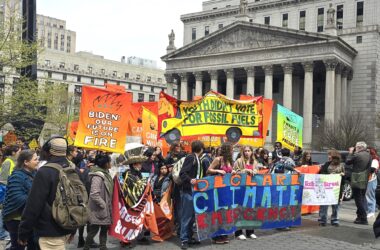According to an attribution analysis by scientists at the international research organization Climate Central, more than 60 percent of the world’s population has faced extreme heat since the middle of this month, made at least three times more likely by climate change.

Due to climate change caused by emissions from burning oil, gas and coal, 619 million people in India and 579 million in China were exposed to extreme heat on June 16-24.
While 231 million people in Indonesia, 206 million in Nigeria, 176 million in Brazil, 171 million in Bangladesh, and 165 million in the United States were affected by extreme heat, 152 million people in Europe, 123 million in Mexico, 121 million in Ethiopia, and 103 million in Egypt were exposed to abnormal heat.
The extreme heat wave affected nearly 5 billion people from June 16-24, including in other parts of the world.
- At least 1,300 killed during Hajj pilgrimage in Saudi Arabia
At least 1,300 people have died from heat-related illnesses during the Hajj pilgrimage in Saudi Arabia, with temperatures exceeding 50 degrees Celsius in some cities.
According to Climate Central’s analysis, Mecca has been at least three times hotter every day since May 18, and five times hotter since May 24, which is five times more likely due to climate change.
Other parts of the Mediterranean, the Middle East and North Africa, especially Greece, have also experienced extreme temperatures, while the United States has experienced two consecutive heat waves.
While at least 125 people died in the first heat wave, which also affected the southern part of the country, Mexico, and Central American countries, the second heat wave affected most of the east coast of the United States. New York saw a 600 percent increase in heat-related emergency room visits.
In India, more than 40,000 people suffered heatstroke and more than 100 people died. Temperatures reached 50 degrees during the day and 37 degrees at night, the highest ever recorded in the country.
- Extreme heat drives up electricity demand
Following extreme temperatures of 50 degrees Celsius in China, the city of Wuhan may begin rationing electricity to meet the additional demand from air conditioning.
In Paraguay, one of the countries in the Southern Hemisphere, temperatures exceeded 38 degrees Celsius, the highest in June, and reached 36 degrees Celsius in Peru.
In Egypt, the extreme heat led to temporary and planned blackouts due to increased electricity demand.
According to the United Nations Intergovernmental Panel on Climate Change (IPCC), extreme heat waves have become nearly five times more frequent, occurring once every 50 years, due to global warming caused by human activities.
- “Even our sacred pilgrimage is now vulnerable”
Andrew Pershing, Vice President of Science at Climate Central, said in his assessment of the analysis that more than a century of burning coal, oil and gas has made the world increasingly dangerous and warned, “The heat waves that have occurred around the world this summer are unnatural disasters that will become more and more common unless carbon pollution is stopped.”
“The deadly heat during this year’s Hajj pilgrimage was directly linked to the burning of fossil fuels and affected the most vulnerable pilgrims,” said Davide Faranda, a researcher at France’s National Center for Scientific Research (CNRS).
“Only a reduction in the use of fossil fuels can prevent critical temperature thresholds from being reached and prevent these important religious pilgrimages from becoming recurring tragedies,” Faranda said, underscoring the need for immediate action to protect the health and safety of Middle Eastern citizens and pilgrims.
Imam Saffet Catovic, Director of UN Operations for Justice for All, noted that climate change is affecting the entire world and said:
“Even our sacred pilgrimage is now at risk, with hundreds of worshippers tragically dying recently due to climate impacts. Immediate action is essential. The world’s oil-rich countries must heed the calls of the UN Secretary General and scientists to move decisively away from fossil fuels and phase them out. These fuels are driving the climate crisis. To address this existential crisis, a decisive and irreversible transition to a renewable energy future is essential. Leaders must act now to protect communities by choosing a sustainable path and turning away from exploitative development practices.” (AA)



 UN
UN 



